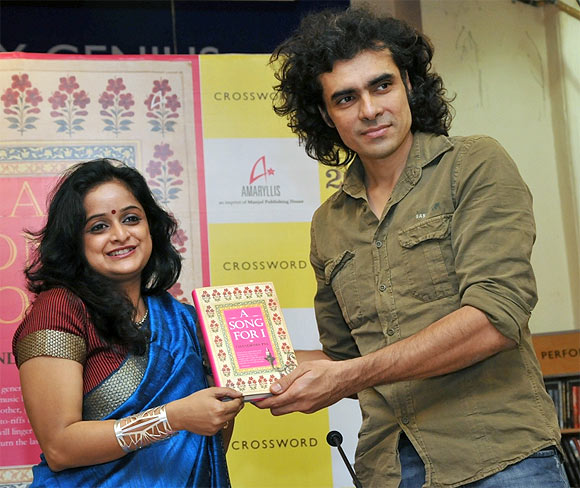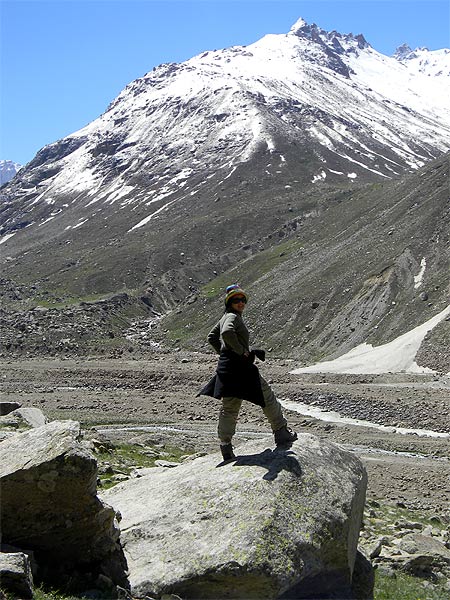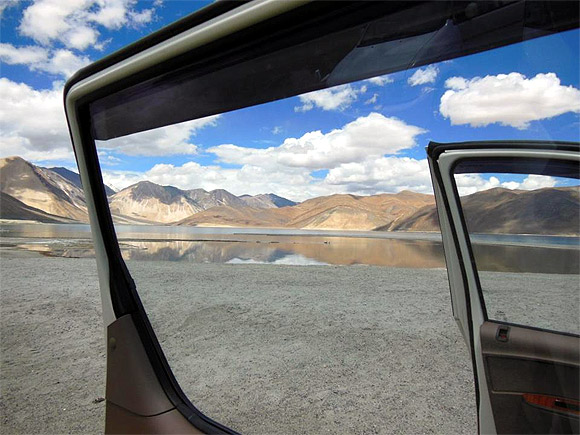 | « Back to article | Print this article |
'The urge to be something extraordinary is ingrained'
In a conversation that offers insights about her relationship with music, and her own journey as a 'hyperactive' career woman, author Chandrima Pal talks to Nishi Tiwari about her debut novel, A Song For I.
Journalist and debutante novelist Chandrima Pal couldn't be happier, now that she's got her first book 'out of her system.'
Her debut in the world of literary fiction, A Song For I, was recently unveiled with much fanfare by Bollywood director Imtiaz Ali (Socha Na Tha, Jab We Met, Love Aaj Kal) at a Mumbai bookstore.
Chandrima, though, is not willing to stop for breath; she is already working on her second book which, according to her, will be "something wicked." It gives you an idea of how she likes to juggle various roles -- during the day, you will find her holding fort as entertainment editor in the tabloid, Mumbai Mirror. She also finds the time to go on trekking holidays -- another passion of hers.
Chandrima comes from a family of accomplished musicians. Her father, Pandit Barun Kumar Pal, is a noted Indian classical musician and a disciple of sitar maestro Pandit Ravi Shankar.
She grew up as a rather precocious little kid, doing everything from singing opera to directing plays, playing Indian classical music on the slide guitar and learning the dance forms, Kathak and Manipuri.
Dressed in animal print pants, a black sheer shirt and brogues, Chandrima talks animatedly and at great length about her debut novel.
In a conversation that's reflective in parts, and replete with stories of her own journey as a 'hyperactive' career woman, Chandrima talks to Nishi Tiwari about A Song for I, her relationship with music and the perks and perils of being a tabloid journalist.
Could you tell us a little about your book?
In A Song For I, music is an important catalyst. It shapes the characters, their personalities, it defines who they are.
That is where the music comes in, but actually it's a story of relationships spanning two generations.
Please click on Next to find out why Chandrima's book made people uncomfortable...
Click here to purchase your copy of A Song For I.
Catch Chandrima Pal on Rediff ZaraBol this Thursday, December 13, at 3 pm!
'Some key people who read the book got a little uncomfortable'
How much of you has gone in the book? We read in the beginning of the book that the protagonist, Ira, is brought up with the belief that she is destined for great things in life. It sounds similar to what you say about yourself on your website.
I put a lot of myself in the book but not in any particular character. Each character will have a bit of me.
'Destined for greatness' is something a lot of us grow up hearing, especially where I'm come from. In a middleclass Bengali household, people are into the arts or academics, so this urge to excel or be something extraordinary is ingrained. It's not just me; there are a whole lot of people who are brought up to believe that they have to be different.
Some people really take that in their stride and try to do something out of the ordinary with their lives while some people don't really care.
At the Jaipur Literature Festival, Lionel Shriver (the author of We Need To Talk About Kevin) said writing about family is always tricky. There will always be someone who will be miffed with you for not having portrayed her/him right or having done so accurately. It's a double-edged sword, she said. Having just written such a novel, you could share your insights?
I made sure that none of them reads it (chuckles). I'm kidding!
So far I haven't heard anything. Some key people who have read the book -- I won't take names because they are famous -- got a little uncomfortable.
They thought that some things were too vivid. It's alright to be a part of it but it gets uncomfortable when it's staring you in the face. I also had to ensure while writing the book that I didn't offend their sensibilities.
It's quite tricky because you want to write something that comes to you easily and you want to be honest to yourself and your craft.
At the same time, you also have to figure out just how far you can take your personal experiences because, for every book, someone or the other will say that a certain character resembles them a lot, even if that hadn't been your intention.
And if that happens, I'd think in a way I've achieved what I set out to do because as a writer you want people to relate to your characters.
Please click on Next to find out what's more dramatic – Chandrima's life or her novel...
'My life isn't half as dramatic as the novel'
Have you had to deal with people (who know you in real life) speculating about just how similar your story is to your life? If yes, how do you handle it?
Barring one incident in the book and the rock concerts I describe, there's no resemblance between the book and the real me.
My life isn't half as dramatic as the novel.
Did you face any obstacles while writing the book? What was the whole process like? Tell us a little about the rejection slips. Were there any in your case?
When I started out, the characters were very different, the setting was different. It was in the science-fiction-fantasy kind of a realm and the music was electronic.
But it was a story about relationships. So that bit remained.
As I worked through successive drafts, as the setting changed and the characters got real, the music changed too.
Long after that, I realised that the story had started unravelling itself.
Click on Next to read about the huge risk that Chandrima took...
'My novel is for the discerning reader who's not tone deaf'
Literature that focuses on music is a fairly niche segment in India. Who is your target reader?
It's the slightly older audience, the discerning reader who's not tone deaf.
At the end of the day I've used a lot of musical terms, so it's for someone who gets the references easily.
There was this person who was interviewing me about the book and hadn't read it all through the end perhaps, because he asked me how the protagonist goes from classical music to death metal (there is absolutely no mention of metal or death metal in the book).
My target is very niche.
I've also opened a challenge for myself -- not only will a person have to know one form of music but also be open to the other form.
It's not about one genre triumphing over the other in the end. It's about music being a catalyst with its spiritual as well as the sensual aspect.
It's a metaphor for different points of views and philosophies of life.
What's your own relationship with music like? Did you, at any point of time in your life, feel obliged/compelled to take up music as a career?
There were lots of expectations from me. But it was more in terms of excelling at whatever I took up.
To be brutally honest, the day I knew that I didn't have to pursue music as a profession was actually the day I started enjoying music. That's also roughly around the time when I found myself open to different forms of music.
Now, I am at a stage where I can be absolutely emotional when I listen to the Blues and equally stirred by Rock.
I try not to get into the technical aspect of music.
But that's not just with music. They say that if you love literature, you should never study it. It takes all the joy out of it.
Click on Next to find out what happened when Chandrima met Pranab Mukherjee...
'People don't think too highly of our profession'
You've been an RJ and worked in advertising before you became a journalist. Perhaps you could tell us a little about that part of your life?
I was hyperactive and I couldn't sit still for a moment. When my friends were going through that phase of just sitting around and not doing anything, I was working 10 hours a day.
I would get up at 7.30 in the morning and attend my French classes. I was also giving tuition to some kids in the neighbourhood.
I started working in advertising after my graduation and, by the time I finished my Masters, I'd decided that advertising didn't work for me.
So I started out in journalism as a feature writer.
Your website mentions you've met world leaders, interviewed legends and travelled for hard news stories. Could you tell us about some of your more memorable interactions?
One particular meeting with Pranab Mukherjee stands out. Eight years ago, I went to meet him in his office in South Block (in the Secretariat building, New Delhi).
As I entered the office, the first thing that struck me was the tiny man sitting in a tall upholstered chair with a pink towel over it.
But he was a bundle of energy. The entire setting was so magnificent – tall ceilings, paintings and this tiny man amidst all this opulence.
Even when I went to his son's house in Chittaranjan Park later, they were frying fish. That was a very interesting experience -- to see a person who meets world leaders and was a defence minister then, leading such an unassuming life.
Another story that really humbled me made it to the front page of the Mumbai Mirror (where Chandrima works). It was about an acid attack victim and got a massive response.
For once, I felt good about what I was doing because people don't think too highly of our profession. For once, I was on the receiving end of all this appreciation.
Click on Next to find out what Chandrima has to say about Bollywood's younger stars...
'No metropolitan city is kind; Delhi is the harshest'
You've lived and worked in at least three metropolitan cities. What were your experiences? Which would you say has been the kindest and the harshest of the cities?
No metropolitan city is kind. Delhi is the harshest; it makes you a different person. I didn't enjoy my Delhi stint at all.
Among other things, you have also been a gossip columnist. Do tell us how this works. What sort of pressures did you face while being one? Would you like to go back to being one again if you had the opportunity?
It was very strange. It made me a celebrity overnight but I didn't like it at all. I'm a middle class girl and we aren't supposed to gossip about others, let alone write a column about it!
It just went against my grain. I've grown out of that phase now.
As the editor of the entertainment beat, what would you say your greatest learnings were while dealing with studio chiefs and movie stars? Could you share some anecdotes.
The younger Bollywood stars are well-read and smart. You can't fool them. You also get a sense that they don't like journalists.
But when they come across someone they think they can treat as equals, the equation changes.
The image that we generally have of stars is that they are very shallow and vain, but the current crop is more sorted. They wear their stardom very lightly. They are people you would want to know better.
Click on Next to find out about Chandrima's 'wicked' plans...
'I just love the dark side of people'
You are working on your next book which, according to your website, 'marries your experience as a tabloid journalist with your love for the macabre.' Could you please elaborate?
I'm a huge fan of Roald Dahl. I just love the dark side of people and unpredictable situations he depicts in his stories.
Roald Dahl told us that there's a dark side in everybody. And when you're working in a tabloid newsroom, it's the best place to see the dark side of a city. It's amazing to know what's going on in the city.
Most of the stuff that we hear about doesn't make it to the pages but there's so much happening in the city on a daily basis.
There's so much material that I have a strong desire to make use of all this amazing material we have access to.
And now that my first book is out of my system, I feel a lot lighter and really want to do something that's wicked (chuckles).
What would you like to be remembered as -- a journalist or an author?
A writer.






